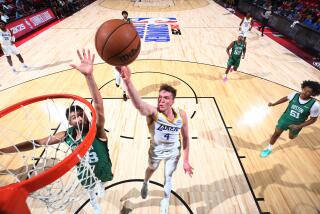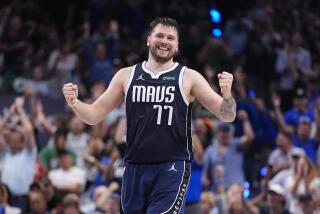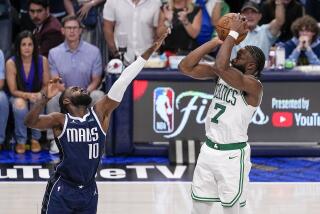Lakers Save Their Best for Celtics : Pro basketball: Magic has 21 assists and L.A. hits two-thirds of its outside shots to win last matchup of the decade.
BOSTON — The Laker-Celtic rivalry endures, even if its latest incarnation might suggest otherwise. Pulses quicken, expressions harden and intensity peaks for the combatants, indicating that this is anything but just another date on the interminable NBA docket.
Or so the Lakers claim.
Friday night, in the final meeting of the ‘80s between professional basketball’s most familiar antagonists, the Lakers first disarmed and then shot down the Boston Celtics, 119-110, before 14,890 fans at Boston Garden.
Laker Coach Pat Riley unblushingly called this his team’s best game of the season. That should not surprise, given the opponent and the inherent motivation.
“You should have been in our locker room before the game and seen the intensity,” Riley said. “The guys were dead serious.”
It figures to always be this way, at least as long as Magic Johnson and Larry Bird are the participants.
The Celtics may be struggling at 12-10, Bird may be searching for the missing touch on his jump shot, and both aging teams might be hearing their biological and basketball clocks ticking. But the Lakers (17-5) say they will always consider the twice-seasonal meetings with the Celtics special.
“Of course,” Johnson said. “Any time you win in Boston is a big win. I mean, it’s not like we’re playing some other team. This is Boston . Back in L.A., this is probably the only game they care that we win. They don’t care if we beat anyone else.”
This time, the Lakers accomplished that task by wearing down the Celtics with fast breaks and, in no mild surprise, by making 66% of their outside shots. Thirty-one of the Lakers’ 44 field goals came from the perimeter.
Shooting only 46% through 21 games, the Lakers saved their best shooting night for the Celtics. Again, that probably is not a coincidence.
A.C. Green, starting at center in place of the injured Mychal Thompson (sore left heel), scored 25 points and had 11 rebounds. Green made eight of 12 shots, six field goals coming from the perimeter.
Michael Cooper, starting at small forward and drawing Bird on the defensive end, sank two three-point attempts in the second quarter and limited Bird to 12 points through three quarters. Bird finished with 21 points, though making only nine of 27 shots.
James Worthy, scoring from both inside and outside, had 26 of his game-high 28 points through three quarters. Worthy sank 13 of 19 shots, including three consecutive jump shots from 18 feet late in the third quarter.
About the only Laker who shot poorly was Johnson, the only Laker the Celtics chose to double-team. He made four of 12 shots, but had 21 assists. Many of those assists went to Byron Scott, who made nine of 15 shots for 21 points.
What made this Laker victory even more impressive was that the Celtics did not play poorly. They shot 53%, Dennis Johnson scoring 24 points, Robert Parish 23 and Kevin McHale 21.
Bird, as competitive as always and not usually generous with compliments, finally conceded after Friday’s loss that the Lakers have done a better job maintaining their high level of play, while the Celtics have not.
“There’s no question now that they’ve got the better team,” Bird said. “They’re a better defensive team. They’re a better offensive team. Now, I can say it honestly for the first time. Right now, they have to be the contender for the NBA championship.”
Bird might get some arguments from the Detroit Pistons and others, but the Lakers were at their best and perhaps even unbeatable Friday night.
The Lakers and Celtics know each other so well that simple execution usually decides the victor. These teams cannot surprise each other, nor do they play uninspired.
Using their standard weapon--Cooper--on Bird, the Lakers made him work for his shots. Bird is shooting 45.6% this season, but he was coming off his second-best game of the season--a 40-point effort Wednesday night against Seattle.
Though hobbled by a stiff knee, a sore lower back and incurring a cut chin in the second half, Cooper kept Bird on the move and limited his open shots. Through three quarters, Bird had made five of 20 shots, and three of his fourth-quarter baskets came with Orlando Woolridge guarding him.
“I got a lot of help from my teammates,” Cooper said. “What we always try to do is push him to what we call the wall. That means into another player so I can get help. But Larry’s still going to get his points.”
True, but Bird did not dominate as before. The Celtics were competitive nonetheless, but they did not have the offensive versatility to overcome the Lakers’ consistent outside shooting and transition baskets.
Although the Celtics shot 62.8% in the first half, the Lakers still led, 60-55.
“I had to feel good about that,” Riley said.
Although the Celtics staged run after run in the third quarter, the Lakers withstood the assault by sinking jump shots. Every time Boston pulled close, the Lakers countered. Green made three perimeter shots, Scott two and Worthy three in a row in a 1:05 span late in the quarter.
Despite making nine of 14 perimeter shots in the quarter, the Lakers led by only three, 85-82, entering the fourth quarter.
One minute and 55 seconds into the final quarter, however, the Lakers had the game in hand, thanks to a 12-0 run. The surge included just about everything--a three-point play by Woolridge, a three-point shot by Scott, a fast-break layup by Worthy, a Johnson jumper and an inside basket by Vlade Divac--and gave the Lakers a 97-82 lead.
The lead did not dip below seven points the rest of the game. Whenever Boston made even a hint of a run, the Lakers countered by making jump shots.
After Bird scored seven quick points midway through the quarter to pull the Celtics within eight, the Lakers called time out. Worthy responded by making a jump shot. A few possessions later, Green sank a jumps shot after the Celtics pulled to within eight.
Perhaps the best example of the Lakers’ shooting accuracy (luck?) came with 2:46 to play and the Lakers leading by 11 points. Divac found himself with the ball 20 feet away from the basket and one second left on the shot clock. He hoisted a jump shot that, naturally, was a swish.
“This is the first game we’ve really shot well,” Cooper said. “The reason we did it was because we moved the ball around well and people were catching passes in position to shoot.”
The Lakers’ perimeter game frustrated the Celtics.
“I thought we did a great job inside against them,” McHale said. “But they lived off the jumpers.”
Added Parish: “The way they moved the ball made it impossible for our defense to get there in time to (contest) shots. We got caught in a transition game, too, and that killed us.”
The Laker-Celtic rivalry, too, is caught in a transition period. Though it may never again reach the competitive level of the early and mid ‘80s, it probably will continue to be a series a rooted in tradition and a small measure of acrimony.
The Lakers, with Friday victory, hold a 23-17 advantage over the Celtics during the Bird-Johnson era.
“There’s going to be a lot more great games between these teams,” Riley said.
Laker Notes
Center Mychal Thompson tested his sore left heel before Friday night’s game. Apparently, he did not pass the test. “Gary Vitti (Laker trainer) said if I can’t run without a limp, I can’t play, and I’m limping,” Thompson said. “It feels a lot better than the other day. I think I’ll be able to go in a couple more days.” That, however, would preclude Thompson from playing in tonight’s game against the New Jersey Nets.
More to Read
All things Lakers, all the time.
Get all the Lakers news you need in Dan Woike's weekly newsletter.
You may occasionally receive promotional content from the Los Angeles Times.







